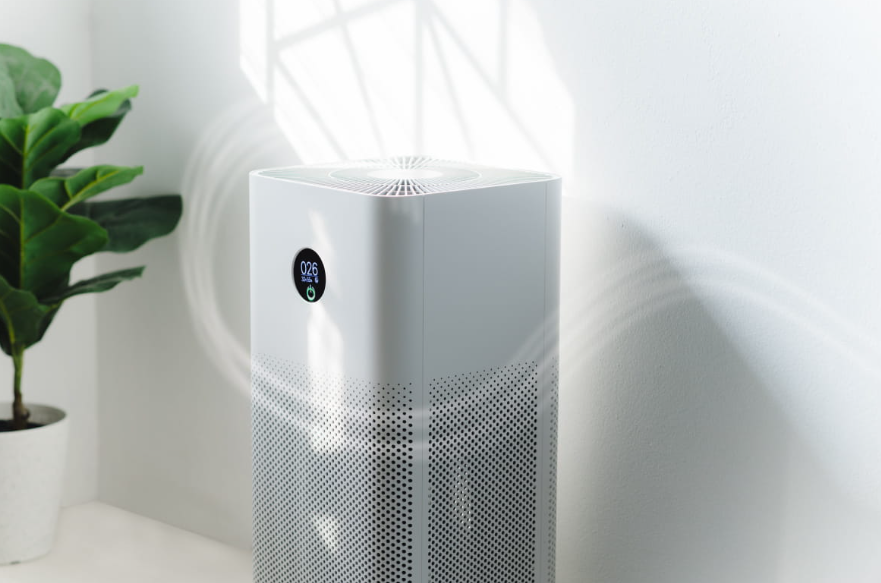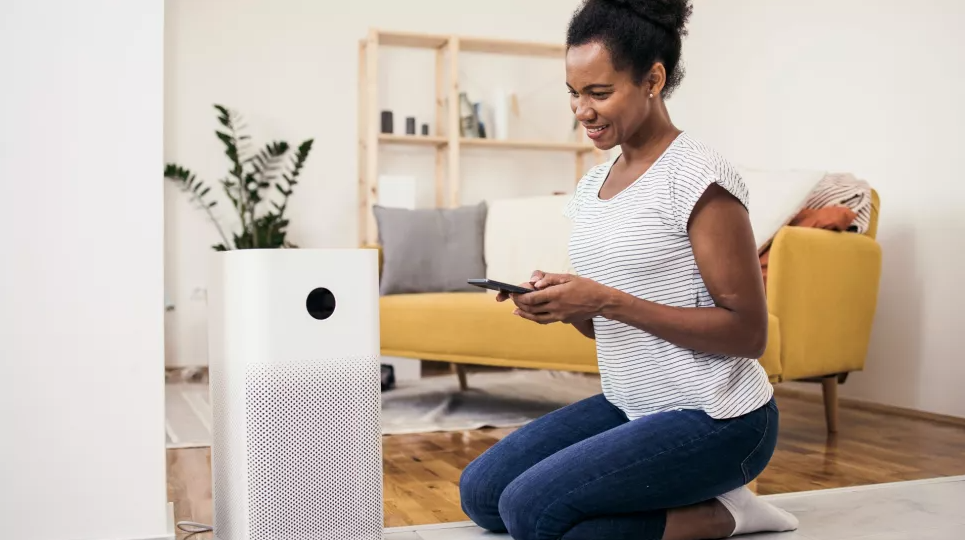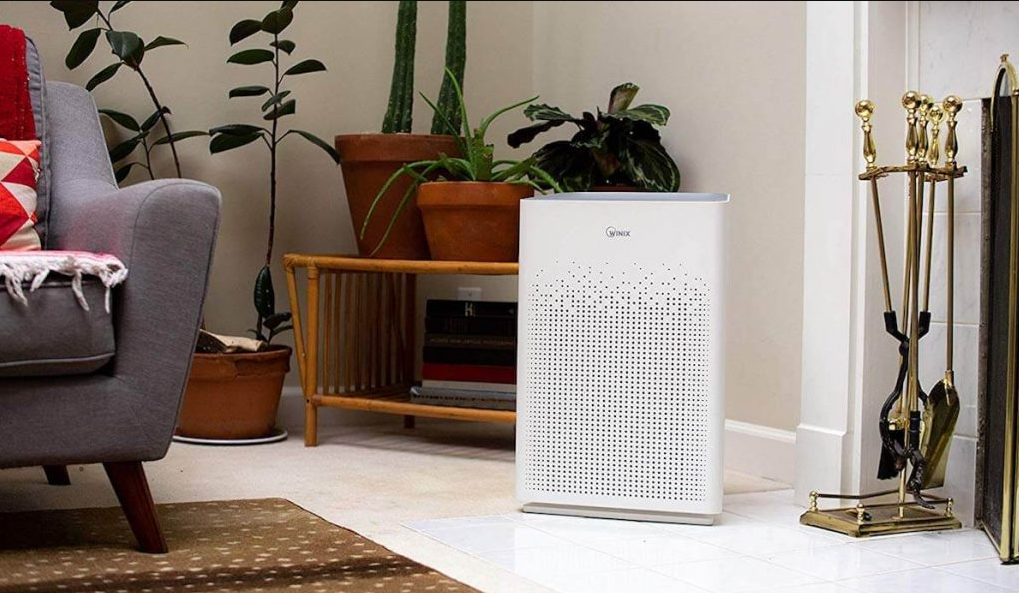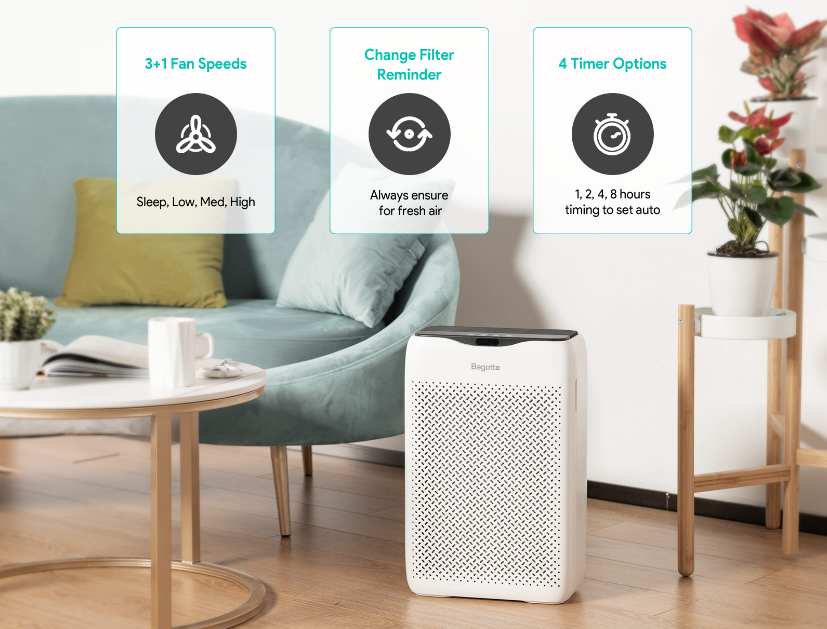Contents
“To stay healthy and strong, life must have clean air, clear water and pure food.”
John Africa
You’ve probably heard that an air purifier is a safety device that can bring not only benefits but also harm. In some sources, you can find information that air purifiers cause coughing, nausea, and other symptoms. In this article, we will figure out can an air purifier make you sick and how to choose the right air purifier.
Can air purifiers be harmful?
Air purifiers are not dangerous if they simply purify the air from small dirt particles and do not produce a by-product. Can an air purifier make you sick? And the answer will be the same – it cannot be dangerous for your health if all the conditions of use are met. But if the purifier produces ozone, then it can be harmful to your health, especially if you suffer from asthma or are prone to allergies.
Such air purifiers are called ozone generators. If a person inhales ozone for 7 hours, even in a small concentration (0.08 parts per million), it can cause throat irritation, chest pain, cough, inflammation, shortness of breath, etc.
Moreover, constant exposure to ozone can cause irreversible damage to the olfactory organs, lung tissue cells, and other respiratory diseases. However, most people do not pay attention to the primary symptoms, especially since the symptoms disappear over time.

Can air purifiers cause a sore throat?
This is a frequently asked question – can air purifiers cure a sore throat? No, rather the opposite – cleaners, in which HEPA filters are installed, prevent sore throat because they purify the air from bacteria that cause diseases in the throat. Thus, clean air helps to get rid of sore throat, runny nose, and allergic reactions.
Irritation and sore throat can be caused by air purifiers, which are called air ionizers. Especially if you already have a chronic respiratory disease, such as asthma. To purify the air, ionizers emit charged particles into the air. As a by-product, ozone appears together with these particles. And ozone can cause symptoms such as irritation and sore throat.
Can air purifiers cause coughing?
If you cough from time to time while at home for no reason, then you may think it’s because of the air purifier. Coughing can cause an ionizer, but not an air purifier. High-quality mechanical air purifiers will not cause a cough and will not aggravate it, but on the contrary, will help to alleviate the cough by removing all bacteria from the air using a multi-layer filtration system.
Can air purifiers cause a headache?
Chronic or sinus headache is caused by irritants such as dust, debris, dust mites, mold spores, pollen, pet dander, germs, and odors. Many air purifiers can relieve headaches by purifying the air in the room from all irritants.
Can air purifiers cause nosebleeds?
By themselves, air purifiers cannot cause nosebleeds, but they can aggravate some symptoms in an unfavorable environment. If the air in your house is too humid, which can cause postnasal congestion, inflammation, sinusitis, and nosebleeds, then the air purifier will not change this.
In this case, you will need to install an additional dehumidifier to reduce the humidity level in the house. Also, too dry air can cause nosebleeds. In this case, you will need an air humidifier to achieve an ideal humidity of 30-50%.

People also often ask: Can you drink water from a dehumidifier? Read the answer to this question here.
The different types of air purifiers
Air purifiers come with different sets of characteristics. Of course, mechanical air purifiers are considered the best, which pass air through several filters, improving air quality. Other purifiers also purify the air, but they can emit additional products at the same time.
Filter-based/ Mechanical air purifiers
HEPA air purifiers are the safest ones. Mechanical air purifiers use a fan that drives air through several filters and then releases purified air into the room. The pre-cleaning filter traps large dust particles, fibers, hair, and fluff. The next is the HEPA filter, which traps microscopic particles – pollen, mold, and bacteria.
Additionally, instead of a HEPA filter, there may be an activated carbon filter. Such a filter is capable of absorbing gaseous pollutants, such as the smell of cooked food, carbon monoxide (CO), nitrogen dioxide (NO2), tobacco smoke, etc.
HEPA air purifiers are considered to be the best because they are highly effective without releasing by-products. Such air cleaner is widely used all over the world in homes, hotels, shops, factories, hospitals, etc.
Mechanical air purifiers are safe technology for air purification, however, if you install an air cleaner with a low capacity in your home, it will not be able to sufficiently purify the air in the room. Can a HEPA filter make you sick? No, air purifiers that use a HEPA filter are completely safe and cannot cause you to get sick.
In this case, you will have to change the filter very often to maintain the filtration efficiency. For example, if your air purifier has a capacity of less than 100 cubic pounds per minute, then it is not able to clean all the moving air in the living room.
UV Air Purifier/ UVGI/PCO air purifier
UV air purifiers effectively kill germs, bacteria, and viruses. Such air cleaners are completely safe and are used in many places. However, to sterilize the room, the UV air cleaner takes a long time. During this time, the same large and heavy particles, like hair and pet dander, fall on the surface.
Also, with regular use, the effectiveness of the UV lamp in the cleaner decreases sharply. For example, the effectiveness of UV dumps may decrease by 60% in a year. There has also not yet been an official study of the work of UV purifiers, so you can only believe the information provided by the manufacturer.
During operation, UV air purifiers create ozone as a by-product, but it is released in such small amounts that you will not even notice it, and it will not harm you.

Ionizer/Electrostatic precipitators
The principle of operation of the ionic air purifier is as follows: the device disperses up to 10 million negatively charged ions into the air, which adhere to positively charged ions in the air.
The ions cling to each other and then settle on the surface of the room. However, electronic air purifiers are supplied with a special collector plate that collects the fallen ions so that pollutants do not disperse throughout the room.
The electronic air purifier is a safety device for air purification since negative ions are a safe and natural phenomenon of nature, and they can’t make you sick. In the course of its work, the ionizer also releases a small amount of ozone, which cannot affect your health and well-being in any way.
However, the disadvantage of the electronic air purifiers’ work is the need to regularly vacuum the floor in the room so that the fallen particles do not rise into the air again. In addition, ionization is a slow process, which shows much less efficiency compared to mechanical cleaners. In addition, the released ions can cause a faint smell of burning and increase the likelihood of damage by static electricity.
Ozone generator/Ozonator
The ozone generators produce harmful ozone, so you should avoid using this device. In addition, the Environmental Protection Agency (EPA) does not recognize the Ozonator as an air purification device.
Why is ozone so harmful? Ozone (O3) is a molecule consisting of three oxygen atoms. Ozone is not a stable molecule because the third oxygen atom can detach and then rejoin the molecule of another substance.
Ozone can react chemically with household cleaning products, and prematurely destroy rubber and plastic, even in a small concentration. All these interactions of ozone with things and household chemicals in your home can lead to the release of toxic gases harmful to your health. Therefore, in no case, it is recommended to use an ozone generator as an air purifier in your home.

When can an air purifier make you sick?
What are the side effects of air purifiers? If you use a high-quality air purifier, then it cannot cause you any side effects. But in very rare cases, a purifier can make you sick. This can happen if:
- You are not using a high-quality air purifier, or your device is not adapted to the area of your home and the type of pollution.
- If you do not properly care for your purifier – do not change filters regularly and do not wash the area around the device. Can a dirty air purifier filter make you sick? Yes, unfortunately, a dirty filter in an air purifier can cause allergies or worsen the symptoms of asthma and other chronic respiratory diseases.
- If you place the air purifier incorrectly, it must be in the right place, for example, in the source of the smell, and must have access to air from all sides.
- If your purifier is too small for the room and does not cope with its task.
- If you accidentally bought a disguised source of ozone, which an unscrupulous seller sold you under the guise of an air purifier.
How to choose the right and safe air purifier
To properly and effectively clean the air in your home, you need a safe air purifier. Here are some recommendations for choosing an air purifier:
- Give preference to air purifiers with mechanical filtration with HEPA filters and activated carbon filters.
- The airflow and card capacity must be at least 200 cubic feet per minute.
- If one purifier is not enough to purify the air in your entire house, it is better to install an additional one.
- Avoid buying an ozone generator.

Air purifier safety considerations
Improper care or use of an air purifier can lead to a decrease in its effectiveness or even malfunction of the purifier. So, you should know how to use your air purifier properly:
- Do not place the air purifier in direct sunlight and do not use it outdoors.
- If the humidity level in your house is above 60%, then first install a dehumidifier to reduce the humidity level, and only then use a purifier.
- Do not open the windows while the air purifier is running, so clean air will not escape outside.
- Do not plug the device into a damaged outlet.
- Do not place foreign objects in the air purifier vent.
- In no case, you do need to use an air purifier as a dryer.
- Do not attempt to disassemble and assemble the air purifier yourself because this will lead to the cancellation of the manufacturer’s warranty.
When should I use an air purifier?
Use an air purifier if you feel that there is poor air quality in the room or if you cannot ventilate the room. However, you should know that airing will only temporarily solve your problem. A good air purifier, for example with a HEPA filter, will help you improve air quality. The mechanical purifier will help to cope with chemical vapors, carpets, pets, solvents, paints, household cleaning products, etc.
Conclusion
A good air purifier cannot cause you to get sick because its function is to purify the air from bacteria and microbes. However, if you use an ozone generator as an air purifier, you may experience headaches, cough, throat irritation, and aggravation of asthma and allergy symptoms. In addition, ozone generators are not air purifiers.
Read also: HUMIDIFIER AND AIR PURIFIER: DO HUMIDIFIER HELP WITH DUST OR AIR PURIFIER IS THE ONLY OPTION?

My name is Ami Moore. I am a teacher by education, but I do not work in this field.
I feel an urgent need to share the best practices and my conclusions about air cleaners with my readers. After all, I understand that choosing the right air purifier takes time. Finding and selecting the right air purifier can quickly get complicated with so many brands, technologies, and styles.
I strive to educate my readers to help them make informed decisions to focus on what matters most: health and wellness.
I ran into many questions on this topic when I had to improve the air in my house and tried to study them as best I could. And it is these thoughts that I share with my readers.
